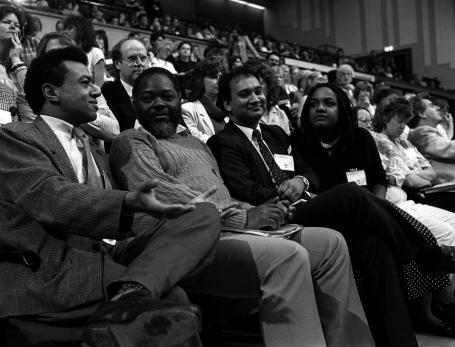
They all were Labour M.P.s and their names were Dianne Abbott, Paul Boateng, Bernie Grant, and Keith Vaz. At Westminster they joined the Labour peer, Lord Pitt, appointed to the House of Lords in 1975.
Square
Dianne Abbott
Diane Abbott’s election to represent the London constituency of Hackney North and Stoke Newington made her Britain’s first Black woman MP. Born in London of Jamaican parents, Abbott was educated at Harrow County Girls’ Grammar School and Newnham College, M.A.Hons. History, Cambridge University.
A journalist by profession, she had worked as an administrative trainee with the Home Office; Race Relations Officer for the National Council for Civil Liberties; a reporter with TV AM and Thames Television; Public Relations Officer with the GLC and Head of Lambeth Council’s Press Office.
Abbott was active in the Black Sections movement within the Labour Party and in community politics, including OWAAD (Organisation of Women of African and Asian Descent); the “Scrap Sus” campaign to ban police stop-and-search tactics levelled at Black youth, and was a founder member of the Black Media Workers’ Organisation.
Active for many years in the trade union movement, particularly on race equality issues, Ms Abbott served for a year as Britain’s first Black female Equality Officer in the Association of Cinematograph Television and Allied Technicians. She also served as an elected local councillor in the London Borough of Westminster for four years, during which she was a member of the Environment, Grants and Social Services Committees.
Paul Boateng
Born in the Gold Coast (now Ghana), West Africa, Paul Boateng was educated at the Ghana International School and Accra Academy, and later at Apsley Grammar School and the University of Bristol, England. Boateng qualified as a solicitor in 1976, and was called to the Bar in 1989.
His political life began with membership in the Labour party in 1966 and he became a prominent member of the Greater London Council 1981-86, serving as chair of the Police Committee. Elected as M.P. for Brent South in 1987, he severed links with the Black Sections movement in 1988, and became Opposition spokesman on Treasury and economic affairs. He is now Parliarmentary UnderSecretary for Health in the Labour Government.
Bernie Grant
Born in Guyana, and resident in Britain since 1963, Bernie Grant worked as a British Railways clerk, National Union of Public Employees area officer, and as a partisan of the Black Trade Unionists Solidarity Movement. In the political sphere he joined the Labour Party in 1975 and was elected as Member of Parliament for Tottenham.
Grant had served for a decade of service as local councillor in the London Borough of Haringey, of which he was elected Leader in 1985. He was the first ever Black Leader of a local authority in Europe, and in this capacity had responsibility for an annual budget of some £500 million, and the well-being of a quarter of a million people, many of them Black and ethnic minorities.
Bernie Grant brought to parliament a long and distinguished record as a leading campaigner against injustice and racism. He was a founder memebr of the Standing Conference of Afro-Caribbean and Asian Councillors and a member of the Labour Party Black Sections. Grant was a member of the National Executive of the Anti-Apartheid Movement in Britain, with a longstanding concern about the situation in Southern Africa. He also had a keen interest in the affairs of the Caribbean region, and of Central America, Ireland and Cyprus. He was also involved in efforts to tackle racism on a European wide level, in association with European Members of Parliament and European anti-racist groups.
Keith Vaz
Keith Vaz’ gaining of the Parliamentary Seat for Leicester East from the Conservative Party would have been a remarkable achievement in any year. But coming as it did in June 1987 when the national trend was overwhelmingly in the other direction, his arrival as a Black Member of Parliament was viewed as a major political feat. He was also, at 32, Labour’s youngest MP.
Keith was born in Aden, South Arabia, his family originated from India. He was educated in Twickenham and Hammersmith schools and at Gonville and Caius College, Cambridge University, and gained BA Law Hons. and MA Hons. degrees. Before his election he was solicitor to the Highfields and Belgrave Law Centre in Leicester. He stood as a parliamentary candidate in Richmond, Surrey when he was just 25, and a year later contested Surrey West in the European election. His sister, Valerie Vaz, was at the time the Deputy Leader of the London Borough of Ealing, the first Black woman to hold the post.
Lord David Pitt
Lord Pitt of Hampstead, now deceased was the longest serving Black Parliamentarian, having been granted a life peerage in 1975. Born in Grenada, he came to Britain in 1933 to study medicine at Edinburgh University. His achievements in his two chosen careers of medicine and politics were considerable. In 1943, while practicing medicine in Trinidad and Tobago, he was founder member and leader of the Westindian National Party.
Upon his return to live in Britain in 1947 he served as a Member of London County Council and a Chairperson of the Greater London Council and, from 1985-88, as President of the British Medical Association. He was Deputy Chairman of the Community Relations Commission from 1968-1977, and Chairman in 1977. Notably, Pitt was a member of black peoples’ and anti-discriminations organisations such as the Legue of Coloured Peoples and the Campaign Against Racial Discrimination which he chaired in 1965.
As a prominent member of the House of Lords, inner city issues were among his major concerns. He was Chairperson of the Shelter National Campaign for the Homeless; Chairperson of the Race Equality Unit of the Institute of Social Work; President of the Open Door Counseling Service for the Youth of North London; President of the African-Caribbean Medical Society and Co-Chairperson of the Urban Trust, which provided pump-priming finance for projects in inner city areas.
